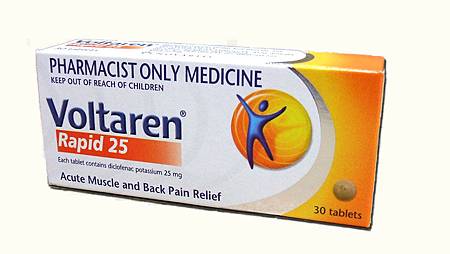
LONDON — The European Medicines Agency (EMA) has finalized a review of recently published information on the cardiovascular safety of nonsteroidal anti-inflammatory drugs (NSAIDs) and concludes that the latest evidence shows a consistent but small increase in the risk of cardiovascular side effects with diclofenac compared with other NSAIDs [1]. The risk with diclofenac is "similar to the risks of COX-2 inhibitors," it states.
As a follow-on, the agency's new Pharmacovigilance Risk Assessment Committee (PRAC) will now assess all available data on diclofenac--both published and unpublished--"to consider the need for updated treatment advice," starting at its next meeting, which will be held October 29–31, 2012.
In this latest review into the safety of NSAIDs, the EMA's Committee for Medicinal Products for Human Use (CHMP) also considered evidence on the cardiovascular safety of other NSAIDs, primarily ibuprofen and naproxen. In relation to these two agents, the CHMP was of the opinion that "the current treatment advice adequately reflects the knowledge regarding the safety and efficacy of these medicines."
The CHMP had reviewed NSAIDs in relation to their possible cardiovascular risks in 2005 and 2006 and at the time concluded that the overall benefit/risk balance of these medicines remained positive but that a small increased cardiovascular risk could not be excluded.
It also acknowledged, however, that the available data were limited and that "methodological limitations of previous studies and existing knowledge gaps made it difficult to reach firm conclusions." As a result, it suggested that the European Commission fund independent epidemiological studies on the safety of NSAIDs, in order to generate robust evidence for the committee’s decision-making.
The Safety of Nonsteroidal Anti-inflammatory Drugs(SOS) project was subsequently set up at Erasmus University in the Netherlands, aimed at assessing and comparing the risk of cardiovascular and gastrointestinal events of NSAIDs. The accumulating findings from published studies, together with the results of the SOS project, were the basis of the CHMP review and led to today's conclusions.
References
-
European Medicines Agency. European Medicines Agency finalises review of recent published data on cardiovascular safety of NSAIDs [press release]. October 19, 2012. Available here.
European Medicines Agency finalises review of recent published data on cardiovascular safety of NSAIDs
Pharmacovigilance Risk Assessment Committee (PRAC) to consider need for updated treatment advice for diclofenac in follow-on review
The European Medicines Agency has finalised a review of recently published information on the cardiovascular safety of non-steroidal anti-inflammatory drugs (NSAIDs).
The Agency’s Committee for Medicinal Products for Human Use (CHMP) concluded that evidence from newly available published data sources, including meta-analysis of clinical trials and observational studies, and the results of an EU-funded independent research project, the ‘Safety of non-steroidal anti-inflammatory drugs (SOS) project, on the cardiovascular safety of this class of medicines confirm findings from previous reviews, conducted in 2005 and 2006.
Most of the data related to the three most widely used NSAIDs – diclofenac, ibuprofen and naproxen. In relation to naproxen and ibuprofen, the CHMP was of the opinion that the current treatment advice adequately reflects the knowledge regarding the safety and efficacy of these medicines.
For diclofenac, the latest evidence appears to show a consistent but small increase in the risk of cardiovascular side effects for diclofenac compared with other NSAIDs, similar to the risks of COX-2 inhibitors, another class of painkillers. As a follow-on to this review, the Agency’s new Pharmacovigilance Risk Assessment Committee (PRAC) will now assess all available data on diclofenac (both published and unpublished) to consider the need for updated treatment advice.
Previous review led to new research
The CHMP had reviewed NSAIDs in relation to their possible cardiovascular risks, gastrointestinal side effects and serious skin reactions in 2005 and in 2006. At the time the CHMP concluded that the overall benefit-risk balance of these medicines remained positive, but that a small increased cardiovascular risk could not be excluded. The Committee also acknowledged that the available data were limited and that methodological limitations of previous studies and existing knowledge gaps made it difficult to reach firm conclusions.
The CHMP suggested that the European Commission fund independent epidemiological studies on the safety of NSAIDs through the 7th framework programme, in order to generate robust evidence for the Committee’s decision-making.
An independent research project (the ‘Safety Of non-Steroidal anti-inflammatory drugs’ (SOS)) was subsequently set up, aimed at assessing and comparing the risk of cardiovascular and gastrointestinal events of NSAIDs. The accumulating findings from published studies together with the results of the SOS were the basis of the CHMP review and led to the conclusions described above.
The formal review procedure for diclofenac will start at the next meeting of the PRAC, which will be held from 29-31 October 2012.
Notes
- The ‘Safety Of non-Steroidal anti-inflammatory drugs’ (SOS) project is led by the ERASMUS University in Rotterdam. More information on this project can be found on the following website
 .
. - The European review of non-selective NSAIDS was conducted in the context of a formal review, initiated at the request of the MHRA under Article 5(3) of Regulation (EC) No 726/2004, on 19 October 2011. The review includes nationally authorised medicines such as diclofenac, etodolac, ibuprofen, indomethacin, ketoprofen, ketorolac, meloxicam, nabumetone, naproxen, nimesulide and piroxicam.
- Non-selective NSAIDS are indicated in the relief of all grades of pain and inflammation in a wide range of conditions, including arthritic conditions (such as rheumatoid arthritis, osteoarthritis, ankylosing spondylitis and acute gout), acute musculo-skeletal disorders (such as periarthritis (for example frozen shoulder), tendinitis, tenosynovitis and bursitis) and other painful conditions resulting from trauma (including fracture, low back pain, sprains, strains, dislocations, orthopaedic, dental and other minor surgery).
- The ‘Safety Of non-Steroidal anti-inflammatory drugs’ (SOS) project is led by the ERASMUS University in Rotterdam. More information on this project can be found on the following website





 留言列表
留言列表
 線上藥物查詢
線上藥物查詢 